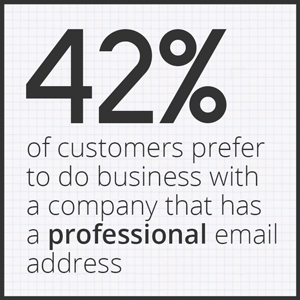42% Increase In Sales After Switching to a Professional Email Address
 A recent study by Zogby Analytics indicated that small businesses had experienced a 42% rise in sales last year after they switched to a professional email address.
A recent study by Zogby Analytics indicated that small businesses had experienced a 42% rise in sales last year after they switched to a professional email address.
The study also showed that with a professional email address, these businesses had a 60% increase in customer engagement, which is a critical bridge to closing a sale.
Survey respondents chose to get a professional email address to inspire customer confidence and trustworthiness, enhance professionalism, further their brand, and stress their legitimacy as a business, according to the study.
“Those ubiquitous Yellow Pages may still be around, but starting a business today is a different ballgame,” writes Rich Rao, Director of Global SMB Sales for Google Enterprise. “With the arrival and explosion of the Internet, new companies rely less on the resources of yesterday and more on tools built in the cloud to help turn their ideas into living, breathing, successful businesses.”
Enhanced Customer Engagement
The study revealed that 60% of respondents with a professional email address experienced a rise in customer engagement (compared to 23% who did not see any increase in customer engagement). More than half of the respondents (59%) cited their professional email address as the key to building trust among customers.
In addition, 45% of respondents said that a professional email address also helps to build customer loyalty. Many small businesses overlook customer loyalty and retention and, instead, focus just on new customers. But another study shows that increasing customer retention rates by 5% increases profits by 25% to 95%. To add to the findings of that study, repeat customers spend an incredible 67% more than new customers, while acquiring new customers can cost your small business five to ten times more.
Furthermore, 81% of the respondents said they are highly optimistic that they will have added growth next year, with 69% accrediting part of their growth to the use of cloud productivity technology.
Zogby Analytics was commissioned by Google to conduct the study, which covered the period from November 20, 2013, to December 5, 2013. Some 500 respondents participated in the online study. These respondents met the following criteria: Decision makers from businesses in operation for three years or less; with 100 employees or less; and use a cloud-based productivity service as an important element in conducting business.
Consumer Survey Findings
 Zogby Analytics, in a separate survey, interviewed 1,000 consumers nationwide (aged 18 – 65+) to measure consumer trust in businesses that have a professional email address (versus businesses that use @gmail.com, @yahoo.com or similar free addresses).
Zogby Analytics, in a separate survey, interviewed 1,000 consumers nationwide (aged 18 – 65+) to measure consumer trust in businesses that have a professional email address (versus businesses that use @gmail.com, @yahoo.com or similar free addresses).
The findings showed that 42% of consumer respondents said they preferred to do business with a company that has a professional email address. Two-thirds of the consumer respondents, or 66%, said they deliberately chose to engage with a business because it had a professional email address (for example, you@yourbusiness.com) over a business that did not have one.
Their findings were presented in a Young Business Success report that was made to honor National Small Business Week. The report showed that young companies across the U.S. credit a large part of their success to the use of cloud productivity technology.
Additionally, 27% said a professional email address has more relevance and impact, while 47% expressed greater confidence that the business is legitimate if it has its own email address.
Cloud Productivity Beyond Email
Aside from getting a professional email address, other cloud productivity technology apps and services help small businesses grow. These include file sharing, collaboration, and video meetings.
Eighty-one percent of the respondents said online file sharing is “critical” to their business because it allows immediate access to data wherever they are. Another 71% cited flexibility as an advantage, noting that they can use any device to send and/or receive data.
Other benefits of file sharing include the fact that all employees can have the latest version of a document in real time (59%), locating files more easily (48%) and having access to a large and growing storage capacity suited to their needs.
Some 60% said they save time with cloud computing, and 40% said they save money. According to the survey, 23% of respondents said an hour saved is worth $200. Another 23% pegged an hour saved at $100.
Seven out of 10 respondents said that time saved is used to position themselves for more success, either by following up new leads (39%), doing marketing-related activities such as social media, advertising, PR, etc. (30%), or engaging in product development (13%), among others.
Success Not Defined by Revenue
Most respondents said they do not define success by revenue. Highest on their scale of success is customer satisfaction (90%), followed in equal measure at 88% by revenue growth, rate of getting new customers, and customer retention. Profitability growth measured at 83%.
The survey noted the access to these cloud productivity technology enabled the new business decision makers to respond more quickly to the needs of their clients (84%), raise productivity (84%), close more deals (73%) and hire remote talent (56%).
Video meetings in particular were cited for improving customer satisfaction (52%), holding meetings with employees (51%), saving on travel cost and on conferencing equipment expense (49%), and permitting face-to-face meetings with people in remote locations (46%).
“Because we work around the clock and around the globe, we have been able to connect to our clients at any time, thus saving money as we no longer have to travel vast distances to get to our clients,” one survey respondent said about face-to-face video conferencing.
At ProjectArmy we assisted many of our small business clients migrating to Google Apps for Business, and we’ve been using apps internally since 2007. It’s been six months since we migrated Pioneer Consulting Group’s email, calendar and contacts to Google Apps. Tim Crockett, Pioneer Consulting CEO, had this to say:
“I would have to say having the most important contacts and information in one place helps collaborate with customers in a more timely fashion, whether that is resolving issues or cross-selling solutions. Google Apps has helped Pioneer Consulting do a better job of working with clients.”
Young Businesses Gain from Google Apps
The biggest business segment that benefits from Google Apps for Business these days are the small businesses. Overhead expenses of the past, such as finding office space, furniture, equipment and paying rent are no longer a necessity to start a new business.
Instead, you can start your business from your home, hire people online, hold video conferences through Skype or Google Hangouts, send out assignments, receive and share documents through email and Google Drive, and do all this wherever you are. All made possible by cloud computing technology, like Google Apps for Business.
“While 8% of business people were using cloud office systems at the start of 2013, we estimate this number will grow to 695 million users by 2022, to represent 60%,” Tom Austin, vice president and Gartner Fellow, says. “Although it is still early in the overall evolution of this cloud-based segment, there are many cases where businesses—particularly smaller ones and those in the retail, hospitality and manufacturing industries—should move at least some users to cloud office systems during the next two years.”
Tweet Corner
Share important takeaways from this post with your followers with 2 clicks.
Photo by Håkan Dahlström/cc
